Samsung SSD 840 Pro (256GB) Review
by Anand Lal Shimpi on September 24, 2012 7:00 AM EST- Posted in
- Storage
- SSDs
- Samsung
- Samsung SSD 840
If we had an award for most improved in the SSD space, it would have to go to Samsung. When we first encountered Samsung MLC drives a few years ago they were pretty bad. Prices were high and performance was low. Samsung offered no end-user upgradable firmware for those early drives either, although that was eventually rectified. The first Samsung MLC SSDs were reliable, they just weren't worth the money when you had much better options from companies like Intel.
Samsung had all of the right pieces for success however. Like Intel, Samsung made its own NAND, controller and wrote its own firmware. Unlike Intel, Samsung stuck to the vertically integrated formula.
I remember arguing with Samsung engineers a few years ago about the importance of random IO performance compared to sequential speed. I remember feeling like they were making the same mistake that all SSD makers were making back then: heavily prioritizing sequential IO when it was a failure to deliver good random IO performance as well that really hurt SSD adoption. Although the first Samsung SSDs weren't very good, they got better over time. While the first generation couldn't be recommended, the Samsung SSD 470 could. It still wasn't our favorite drive, but it finally brought performance up to a reasonable level. Last year's 830 release showed us that Samsung woke up. Today, Samsung is adding two new members to the family: the Samsung SSD 840 and the 840 Pro. The former is the first productized consumer SSD to use Samsung's 21nm 3-bit-per-cell MLC (aka TLC) NAND, while the latter is Samsung's new flagship drive using 21nm 2bpc MLC NAND.
Unfortunately we don't have samples of the unique TLC SSD 840, just the MLC 840 Pro. Despite the use of TLC NAND, Samsung claims the vanilla 840 should offer similar performance to the current 830. Samsung also claims that endurance should be reasonable for consumer workloads.
The 840 Pro should be tangibly faster than the 830 thanks to a new controller, new firmware and new NAND:
| Samsung SSD 840 Pro vs 830 | ||||
| Samsung SSD 830 (256,512GB) | Samsung SSD 840 Pro (256,512GB) | |||
| Sequential Read | 520MB/s | 540MB/s | ||
| Sequential Write | 400MB/s | 450MB/s | ||
| Random Read | 80K IOPS | 100K IOPS | ||
| Random Write | 36K IOPS | 78K IOPS | ||
| Active Power Use | 0.24W | 0.068W | ||
| Idle Power Use | 0.14W | 0.042W | ||
While the 830 used Samsung's 27nm MLC NAND, the 840 Pro uses Samsung's latest 21nm MLC NAND. The move to 21nm will eventually drive NAND pricing lower, although today Samsung expects price parity between the TLC equipped 840 and the old MLC 830. The 840 Pro should sell for a 25 - 30% premium over the current 830.
| Samsung SSD 840 Pro Pricing | ||||||
| 64GB | 128GB | 256GB | 512GB | |||
| Samsung SSD 840 Pro | $99.99 | $149.99 | $269.99 | $599.99 | ||
The move to 21nm is also coupled with a move to a 400Mbps Toggle 2.0 NAND interface. Block and page sizes remain the same for 2bpc MLC 21nm NAND, and maximum capacity per die is still 8GB. Although beyond the scope of this article, 3bpc TLC 21nm NAND sees 50% slower program/erase times compared to the 2bpc MLC 21nm NAND.
Both the 840 and 840 Pro use Samsung's 4th generation SSD controller. Samsung's MAX controller was used in the SSD 470, its successor, the MBX controller, wasn't used in retail drives, while MCX debuted in the 830 and MDX is in the 840/840 Pro. The basic architecture of the controller hasn't changed. Internally there are three ARM9 cores now running at 300MHz. Update: Samsung originally listed ARM9 cores but has since told us that there are three ARM Cortex R4s inside of the new MDX controller.
The MDX controller features a hardware AES-256 encryption engine that's managed using a system BIOS password like most other drives in this class.
The MDX controller is paired with 512MB of LPDDR2-1066 in the Samsung SSD 840 Pro, doubling up the DRAM used in the 830 as well as increasing bandwidth to DRAM by 33%:
| SSD DRAM Size Comparison | |||||
| Drive | Controller | DRAM Size | DRAM Speed | ||
| Corsair Neutron GTX | LAMD LM87800 | 256MB | DDR2-800 | ||
| Crucial m4 | Marvell 88SS9174 | 256MB | DDR3-667 | ||
| Intel SSD 320 | Intel X25-M G3 | 64MB | SDR-166 | ||
| Intel SSD 520 | SandForce SF-2281 | 0MB | - | ||
| OCZ Vertex 4 | Indilinx Everest 2 | 512MB/1GB | DDR3-800 | ||
| Samsung SSD 830 | Samsung MCX | 256MB | DDR2-800 | ||
| Samsung SSD 840 Pro | Samsung MDX | 512MB | LPDDR2-1066 | ||
The 840 Pro will be available in 64 - 512GB capacities. Although the controller supports up to 1TB of NAND, Samsung believes that the ultra-high-density NAND required to hit 1TB is too cost prohibitive at this point. Spare area is set at around 7% by default, although users will be able to adjust it via Samsung's SSD Magician utility. The vanilla 840 on the other hand will boast more spare area (likely to help manage endurance on the TLC NAND) and will launch at 120GB, 250GB and 500GB capacities as a result.
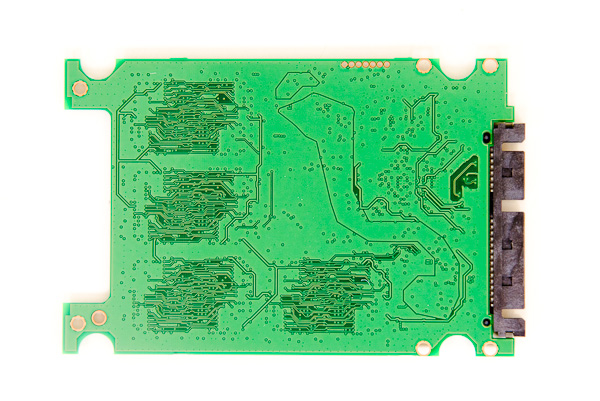
The 256GB SSD 840 Pro features 8 x 32GB NAND devices on the front of the PCB and nothing on the back
The 840 comes with a 3 year warranty compared to a 5 year warranty on the 840 Pro.
The 840 Pro drops the brushed aluminum look of the 830 for slightly more modern, flat black styling. The drives will be available in a 2.5" 7mm form factor, similar to the 830.
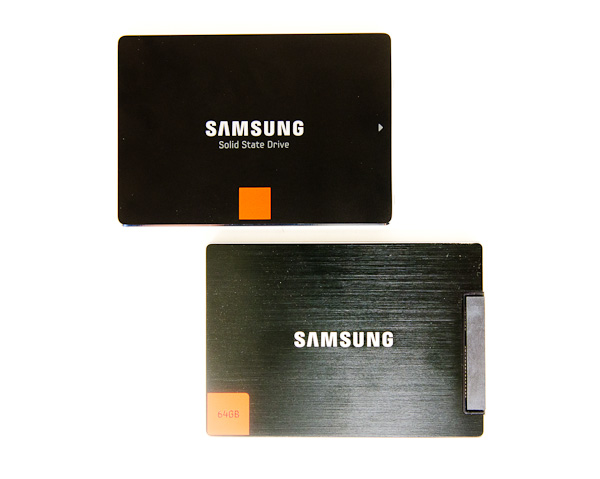
Samsung SSD 840 Pro (top) vs. Samsung SSD 830 (bottom)
Both drives will be available on October 15th, however in advance of the release Samsung provided us with a beta sample for review. We were only able to get a 256GB 840 Pro initially but we've already asked Samsung for additional capacities. The other bad news is after running through our client test suite and preparing the drive for a run through our enterprise suite, our pre-production sample died. This isn't the first time we've had an SSD die during our test process, pretty much every company has seen a failure during one of our reviews, but despite Samsung's excellent track record even it isn't immune from early issues. These drives are a few weeks away from retail and Samsung will be getting our sample back this week to figure out what went wrong.
Update: My replacement 840 Pro also died, I have shipped both drives back to Samsung and are waiting for their analysis of the failures.
Update 2: It looks like this may have been a firmware issue. Retail drives should ship with fixed firmware.
The Test
| CPU |
Intel Core i7 2600K running at 3.4GHz (Turbo & EIST Disabled) - for AT SB 2011, AS SSD & ATTO |
| Motherboard: |
Intel DH67BL Motherboard |
| Chipset: |
Intel H67 |
| Chipset Drivers: |
Intel 9.1.1.1015 + Intel RST 10.2 |
| Memory: | Corsair Vengeance DDR3-1333 2 x 2GB (7-7-7-20) |
| Video Card: | eVGA GeForce GTX 285 |
| Video Drivers: | NVIDIA ForceWare 190.38 64-bit |
| Desktop Resolution: | 1920 x 1200 |
| OS: | Windows 7 x64 |


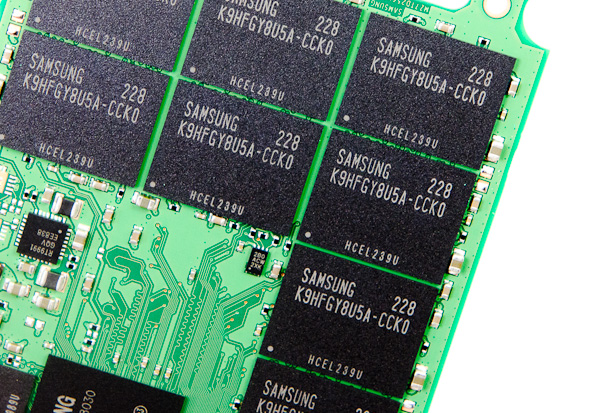
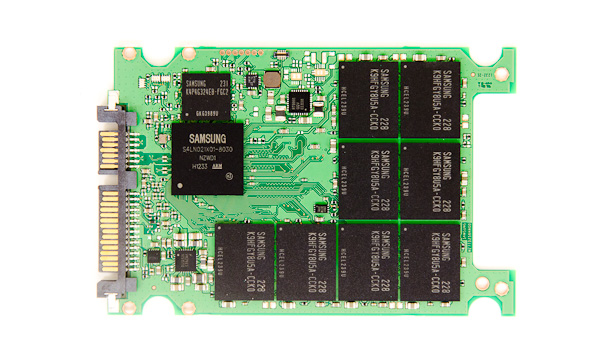
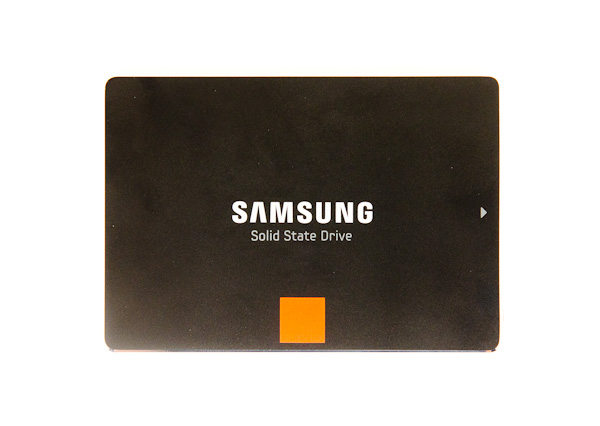








96 Comments
View All Comments
Kristian Vättö - Wednesday, September 26, 2012 - link
We managed to run all of our normal tests (i.e. the stuff needed for this review) and Anand was simply running some enterprise tests to see how the 840 Pro behaves there. This is quite normal testing for us, so it's not like we were trying to break the drive on purpose.A new drive is already on its way to Anand, plus I have the regular 840.
Benny_k80 - Friday, November 16, 2012 - link
What happened to the information about the defect drives? Did Samsung have any explanation?hasseb64 - Thursday, September 27, 2012 - link
Why the big differens between claimed and tested power consumption?Roughly 3 watts is very high in a ultrabook, are there any sub 1 watt SDD left out there?
Per Hansson - Friday, September 28, 2012 - link
hasseb64: look at the previous comments regarding DIPM & EIST.There might be some problems with the testing performed, lack of DIPM can have a huge power consumption difference...
The sampling interval of the device they use to measure power consumption is also very important since SSD's switch power states very very frequently...
GullLars - Friday, September 28, 2012 - link
I just have to say, this drive impressed me. If the stability is the same as 830 Samsung has a real winner here.One of the things i note here is something i've noticed the lack of in other SSDs earlier, and been vocal about. Since the SSDs have large DRAM buffers, they should easily be able to use it as a read-ahead for small block sequential and low QD sequential reads. Going by the iometer 128KB seq read and ATTO graphs, i'd say this is exactly what samsung has done.
It also seems they have implemented a decent sized write buffer to do the same for writes. Let's hope it's implemented safely so you don't loose or corrupt data on powerloss.
I've been recommending 830 lately, and if early reports (after the first month) indicate 840 pro is stable, it will be the my recommendation if the prices are decent.
With the maxing of SATA 6Gbps getting close (or is already here?), it's now time for SATA Express or just native PCIe SSDs.
thefizzle656 - Monday, October 1, 2012 - link
Hey Kristian between the 840 Pro and the M5 Pro which would you choose? It would be going into a 2011 MBP for both OS X and Boot Camp. I'm looking to get a 512 GB drive and it looks like the M5 Pro is going to coming in at less than $450, so my thought is to get the drive that is the cheapest. Please let me know. Thanks.chrcoluk - Friday, October 12, 2012 - link
Whilst these benchmarks all look pretty sweet, they ultimately dont mean much.In real world usage I expect a 840 PRO wont feel any faster than my 830 at all, and the fact they sweep aside a quickly driving drive as not relevant is a worry.
Whilst performance is important, reliability is something I value higher. Also value for money shouldnt be ignored either, so in my opinion the best thing about this drive is it is making the 830 cheaper.
Also the non pro 840 uses TLC which I suspect reduces life expectancy and increases CRC error rates, I would avoid the normal 840 completely whilst MLC drives are still on the market.
So thanks for the review and thanks for the price drops samsung so now I can buy another 830 this time for my laptop :).
dgigibao - Wednesday, October 17, 2012 - link
Several times you recommend the Samsung 830 for Mac OSX users for the same kind of controller whitch Apple in puts in their factory SSD. Whould would recommend 840 Pro for Mac OSX users to?Benny_k80 - Tuesday, November 13, 2012 - link
What happened to the information about the defect drives? Did Samsung have any explanation?FCss - Wednesday, November 14, 2012 - link
I was about to buy this SSD today and just went through the article again and saw the update about the second drive dying. I hope it's not a design flaw.